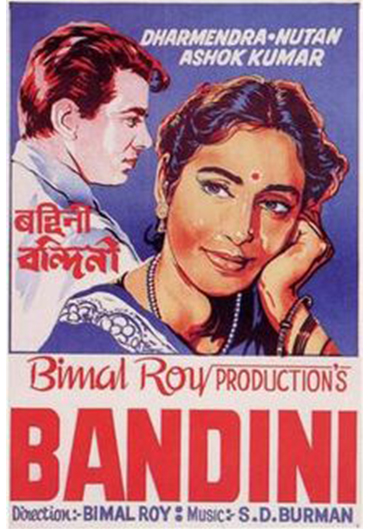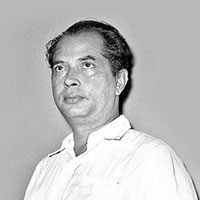Bandini

SYNOPSIS
Bandini (Hindi: बन्दिनी, translation: Imprisoned) is a 1963 Hindi drama film directed and produced by Bimal Roy, the man who directed classics such as Do Bigha Zameen and Devdas. Bandini stars Nutan, giving one of the finest performances of her career, along with Ashok Kumar and Dharmendra as leads, and explores the human conflicts of love and hate intertwined in the mind of Kalyani (Nutan). The lead female role was offered to one of Roy’s favourite actresses Vyjayanthimala, who earlier worked with Roy in Devdas and Madhumati. However, due to her busy schedule she refused the role, which later went to Nutan, who had worked with Roy in Sujata (1959). The movie tells the story of a woman prisoner serving life imprisonment for murder, Kalyani, the all suffering, selfless, sacrificing and strong, yet weak Indian woman. She must make a choice between two very different men, Devendra (Dharmendra), the loving prison doctor, and Bikash (Ashok Kumar), a man from her past.
The film is based on the Bengali novel Tamasi by Jarasandha (Charu Chandra Chakrabarti), a former jail superintendent who spent much of his career as a jailor in Northern Bengal, and wrote many fictional versions of his experiences.
Bandini was the tenth highest grosser of the year and was declared a ‘Semi Hit’ at Box Office India,though it received not just critical acclaim, but also swept that year’s Filmfare Awards, winning six awards in all, including the top awards of Best Film and Best Director, as well as Best Actress, and is still considered a landmark movie of the 1960s, especially being the last feature film of the director Bimal Roy, a master of realism.

This was Bimal Roy’s final feature as a director and regarded by many as his crowning achievement. After casting her, in his previous women-centric film Sujata (1959), now the key laid in persuading Nutan out of her post-nuptial retirement to play the strictly raised, poetry-loving village girl, Kalyani. Nutan is strongly supported by Ashok Kumar and Dharmendra, just beginning to make an impact in the film industry and directed by award-winning director Bimal Roy, who ventures into the life of a convict and reveals his/her humanity and the circumstances that often force an ordinary person to commit a crime. This deep social concern is however conveyed subtly without being didactic, through the predicament of the main protagonist, Kalyani lodged in the prison through the majority of the film and her longing for freedom. The film also highlights the spirit of sacrifice in the youth during the freedom struggle when a youth would even sacrifice his future wife, at his party’s command. Despite having a dramatic turn of events throughout the film, the melodrama never overpowers the narrative, the pace remains engrossing yet easy, and cinematography highlights the stillness and vacuum of prison life. Nutan remains understated through the film, and the director employs irony and symbolism throughout the film to make his statement instead.
S. D. Burman composed the songs for the film, at the height of his musical career and even chose to sing one himself; “Mere Saajan Hain Uss Paar”. The movie has songs such as “Mora Gora Ang Lai Le” by Lata and the haunting and brilliant “O Jaanewale Ho Sake To Laut Ke Aana” by Mukesh. The film is brilliantly photographed in black and white by Kamal Bose, with its rich tonal quality and evocative framing, especially in the stark prison scenes, winning him the Filmfare Award for the year. It was noted for its use of black and white film, to bring “texture and form in simplicity mixed with richness”, especially in the way he captured the prison environment.
Directed & Produced By

Bimal Roy
Writer

Nabendu Ghosh
Music

Sachin Dev Burman
Lyricist

Gulzar

Shailendra
Artist

Nutan

Ashok Kumar

Dharmendra
Back from the flashback in the jail, Deven (Dharmendra), the jail doctor falls in love with her. Kalyani is not ready for it and starts to stay away from him. They are always shown with a partition in between after Deven proposes her. Another symbolism used in the movie is the occasional shouting of “All is well” by the prison guard when nothing in the movie is; and just as Kalyani is leaving prison for good, she receives yet another ironic message from a jail official, “Ab ghar grihasthi ki jail mein qaid rahogi!” Now you will be imprisoned in the jail of household! In the end, she finds Bikash at a ship harbour where she finds him in an ill condition. She then decides to take care of Bikash and her love is again reborn.
The lines “Main Bandini Piya ki, Main Sangini Hoon Saajan ki” in the end score of the movie tells us that Kalyani is imprisoned by her love, thus revealing the title of the film. “Mere Saajan Hain us Paar” is sung by the musician S. D. Burman himself, this climactic song beautifully expresses Kalyani’s dilemma of having to choose between Bikash and Deven. Thus the character of Kalyani gets lifted from that of a woman who is a prisoner of destiny to one who defines her own freedom.
The soundtrack includes the following tracks, composed by S. D. Burman, with lyrics by Shailendra. The film also marks the debut of Gulzar, who was working as an assistant director on the film as a film lyricist, initially having refused Bimal Roy on the offering, saying that he didn’t want to become a lyricist, Gulzar relented only after the film’s music director S.D. Burman convinced him so, and he wrote the song “Mora Gora Ang Lai Le” in five days. The rest of lyrics are by Shailendra, who gave classics like the haunting “Mere Sajan Hain Us Paar” in the bardic voice of S.D. Burman himself, Mukesh’s sad song “O Jaanewale Ho Sake”, where Burman uses Bhatiyali with a variation.
Though the movie features excellent songs, they all depict the situation like nothing else could, like a prisoner singing an ode to an imprisoned bird, “O Panchhi Pyare”, sung by Asha Bhosle and Asha Bhosle’s touching “Ab ke Baras Bhej Bhaiya ko Babul” composed in Raga Pilu, excellently uses the folk idiom of a traditional song of a newly married girl longing for her maternal home, (maika), but being sung by a prison inmate of Kalyani, immediately conveys the irony in its placement.
Back from the flashback in the jail, Deven (Dharmendra), the jail doctor falls in love with her. Kalyani is not ready for it and starts to stay away from him. They are always shown with a partition in between after Deven proposes her. Another symbolism used in the movie is the occasional shouting of “All is well” by the prison guard when nothing in the movie is; and just as Kalyani is leaving prison for good, she receives yet another ironic message from a jail official, “Ab ghar grihasthi ki jail mein qaid rahogi!” Now you will be imprisoned in the jail of household! In the end, she finds Bikash at a ship harbour where she finds him in an ill condition. She then decides to take care of Bikash and her love is again reborn.
The lines “Main Bandini Piya ki, Main Sangini Hoon Saajan ki” in the end score of the movie tells us that Kalyani is imprisoned by her love, thus revealing the title of the film. “Mere Saajan Hain us Paar” is sung by the musician S. D. Burman himself, this climactic song beautifully expresses Kalyani’s dilemma of having to choose between Bikash and Deven. Thus the character of Kalyani gets lifted from that of a woman who is a prisoner of destiny to one who defines her own freedom.

Bimal Roy
Bimal Roy Memorial, All Rights Reserved © 2021
Designed & Developed by Trimoorti Creations.

Bimal Roy
All Rights Reserved © 2021
Designed & Developed by Trimoorti Creations.

